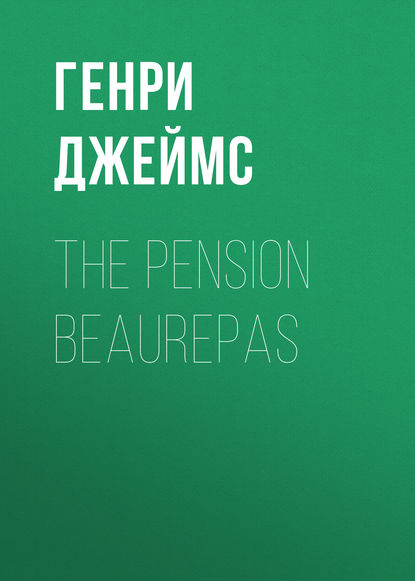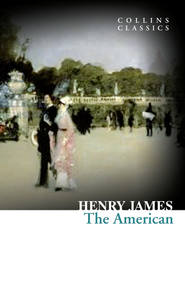По всем вопросам обращайтесь на: info@litportal.ru
(©) 2003-2024.
✖
The Pension Beaurepas
Настройки чтения
Размер шрифта
Высота строк
Поля
"But haven't they common sense? Don't they know they are ruining themselves?"
"They don't believe it. The duty of an American husband and father is to keep them going. If he asks them how, that's his own affair. So, by way of not being mean, of being a good American husband and father, poor Ruck stands staring at bankruptcy."
Mrs. Church looked at me a moment, in quickened meditation. "Why, if Aurora were to go to stay with them, she might not even be properly fed!"
"I don't, on the whole, recommend," I said, laughing, "that your daughter should pay a visit to Thirty-Seventh Street."
"Why should I be subjected to such trials—so sadly eprouvee? Why should a daughter of mine like that dreadful girl?"
"DOES she like her?"
"Pray, do you mean," asked my companion, softly, "that Aurora is a hypocrite?"
I hesitated a moment. "A little, since you ask me. I think you have forced her to be."
Mrs. Church answered this possibly presumptuous charge with a tranquil, candid exultation. "I never force my daughter!"
"She is nevertheless in a false position," I rejoined. "She hungers and thirsts to go back to her own country; she wants 'to come' out in New York, which is certainly, socially speaking, the El Dorado of young ladies. She likes any one, for the moment, who will talk to her of that, and serve as a connecting-link with her native shores. Miss Ruck performs this agreeable office."
"Your idea is, then, that if she were to go with Miss Ruck to America she would drop her afterwards."
I complimented Mrs. Church upon her logical mind, but I repudiated this cynical supposition. "I can't imagine her—when it should come to the point—embarking with the famille Ruck. But I wish she might go, nevertheless."
Mrs. Church shook her head serenely, and smiled at my inappropriate zeal. "I trust my poor child may never be guilty of so fatal a mistake. She is completely in error; she is wholly unadapted to the peculiar conditions of American life. It would not please her. She would not sympathise. My daughter's ideal is not the ideal of the class of young women to which Miss Ruck belongs. I fear they are very numerous; they give the tone—they give the tone."
"It is you that are mistaken," I said; "go home for six months and see."
"I have not, unfortunately, the means to make costly experiments. My daughter has had great advantages—rare advantages—and I should be very sorry to believe that au fond she does not appreciate them. One thing is certain: I must remove her from this pernicious influence. We must part company with this deplorable family. If Mr. Ruck and his ladies cannot be induced to go to Chamouni—a journey that no traveller with the smallest self-respect would omit—my daughter and I shall be obliged to retire. We shall go to Dresden."
"To Dresden?"
"The capital of Saxony. I had arranged to go there for the autumn, but it will be simpler to go immediately. There are several works in the gallery with which my daughter has not, I think, sufficiently familiarised herself; it is especially strong in the seventeenth century schools."
As my companion offered me this information I perceived Mr. Ruck come lounging in, with his hands in his pockets, and his elbows making acute angles. He had his usual anomalous appearance of both seeking and avoiding society, and he wandered obliquely toward Mrs. Church, whose last words he had overheard. "The seventeenth century schools," he said, slowly, as if he were weighing some very small object in a very large-pair of scales. "Now, do you suppose they HAD schools at that period?"
Mrs. Church rose with a good deal of precision, making no answer to this incongruous jest. She clasped her large volume to her neat little bosom, and she fixed a gentle, serious eye upon Mr. Ruck.
"I had a letter this morning from Chamouni," she said.
"Well," replied Mr. Ruck, "I suppose you've got friends all over."
"I have friends at Chamouni, but they are leaving. To their great regret." I had got up, too; I listened to this statement, and I wondered. I am almost ashamed to mention the subject of my agitation. I asked myself whether this was a sudden improvisation, consecrated by maternal devotion; but this point has never been elucidated. "They are giving up some charming rooms; perhaps you would like them. I would suggest your telegraphing. The weather is glorious," continued Mrs. Church, "and the highest peaks are now perceived with extraordinary distinctness."
Mr. Ruck listened, as he always listened, respectfully. "Well," he said, "I don't know as I want to go up Mount Blank. That's the principal attraction, isn't it?"
"There are many others. I thought I would offer you an—an exceptional opportunity."
"Well," said Mr. Ruck, "you're right down friendly. But I seem to have more opportunities than I know what to do with. I don't seem able to take hold."
"It only needs a little decision," remarked Mrs. Church, with an air which was an admirable example of this virtue. "I wish you good- night, sir." And she moved noiselessly away.
Mr. Ruck, with his long legs apart, stood staring after her; then he transferred his perfectly quiet eyes to me. "Does she own a hotel over there?" he asked. "Has she got any stock in Mount Blank?"
CHAPTER IX
The next day Madame Beaurepas handed me, with her own elderly fingers, a missive, which proved to be a telegram. After glancing at it, I informed her that it was apparently a signal for my departure; my brother had arrived in England, and proposed to me to meet him there; he had come on business, and was to spend but three weeks in Europe. "But my house empties itself!" cried the old woman. "The famille Ruck talks of leaving me, and Madame Church nous fait la reverence."
"Mrs. Church is going away?"
"She is packing her trunk; she is a very extraordinary person. Do you know what she asked me this morning? To invent some combination by which the famille Ruck should move away. I informed her that I was not an inventor. That poor famille Ruck! 'Oblige me by getting rid of them,' said Madame Church, as she would have asked Celestine to remove a dish of cabbage. She speaks as if the world were made for Madame Church. I intimated to her that if she objected to the company there was a very simple remedy; and at present elle fait ses paquets."
"She really asked you to get the Rucks out of the house?"
"She asked me to tell them that their rooms had been let, three months ago, to another family. She has an APLOMB!"
Mrs. Church's aplomb caused me considerable diversion; I am not sure that it was not, in some degree, to laugh over it at my leisure that I went out into the garden that evening to smoke a cigar. The night was dark and not particularly balmy, and most of my fellow- pensioners, after dinner, had remained in-doors. A long straight walk conducted from the door of the house to the ancient grille that I have described, and I stood here for some time, looking through the iron bars at the silent empty street. The prospect was not entertaining, and I presently turned away. At this moment I saw, in the distance, the door of the house open and throw a shaft of lamplight into the darkness. Into the lamplight there stepped the figure of a female, who presently closed the door behind her. She disappeared in the dusk of the garden, and I had seen her but for an instant, but I remained under the impression that Aurora Church, on the eve of her departure, had come out for a meditative stroll.
I lingered near the gate, keeping the red tip of my cigar turned toward the house, and before long a young lady emerged from among the shadows of the trees and encountered the light of a lamp that stood just outside the gate. It was in fact Aurora Church, but she seemed more bent upon conversation than upon meditation. She stood a moment looking at me, and then she said, -
"Ought I to retire—to return to the house?"
"If you ought, I should be very sorry to tell you so," I answered.
"But we are all alone; there is no one else in the garden."
"It is not the first time that I have been alone with a young lady.
I am not at all terrified."
"Ah, but I?" said the young girl. "I have never been alone—" then, quickly, she interrupted herself. "Good, there's another false note!"
"Yes, I am obliged to admit that one is very false."
She stood looking at me. "I am going away to-morrow; after that there will be no one to tell me."
CHAPTER X
"That will matter little," I presently replied. "Telling you will do no good."
"Ah, why do you say that?" murmured Aurora Church.
I said it partly because it was true; but I said it for other reasons as well, which it was hard to define. Standing there bare-headed, in the night air, in the vague light, this young lady looked extremely interesting; and the interest of her appearance was not diminished by a suspicion on my own part that she had come into the garden knowing me to be there. I thought her a charming girl, and I felt very sorry for her; but, as I looked at her, the terms in which Madame Beaurepas had ventured to characterise her recurred to me with a certain force. I had professed a contempt for them at the time, but it now came into my head that perhaps this unfortunately situated, this insidiously mutinous young creature, was looking out for a preserver. She was certainly not a girl to throw herself at a man's head, but it was possible that in her intense—her almost morbid-desire to put into effect an ideal which was perhaps after all charged with as many fallacies as her mother affirmed, she might do something reckless and irregular—something in which a sympathetic compatriot, as yet unknown, would find his profit. The image, unshaped though it was, of this sympathetic compatriot, filled me with a sort of envy. For some moments I was silent, conscious of these things, and then I answered her question. "Because some things—some differences are felt, not learned. To you liberty is not natural; you are like a person who has bought a repeater, and, in his satisfaction, is constantly making it sound. To a real American girl her liberty is a very vulgarly-ticking old clock."
"Ah, you mean, then," said the poor girl, "that my mother has ruined me?"
"Ruined you?"
"She has so perverted my mind, that when I try to be natural I am necessarily immodest."

















